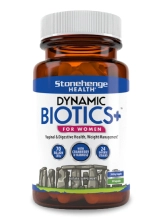One size does not always fit all, especially when it comes to probiotics and women. As women, we know that our bodies are complex and require a more targeted approach to address our specific concerns, such as menopause symptoms, hormonal balance, healthy weight management, vaginal health, and fighting candida overgrowth, excessive bloating, and UTIs.
Just like the stomach has both “good” and “bad” bacteria so does the vaginal and urinary tract. That’s why it’s critical for you to find an effective probiotic that not only helps support proper digestive health but also has the right kind of probiotics and other key ingredients to support urogenital and vaginal health too.
A quick search of the web or any store’s aisles leads to endless probiotic brands, all claiming to cater to women, but most miss the mark. Some boast of high culture counts without the strains beneficial for women’s health, while others may not survive the journey to the vaginal tract. And then there are those that, despite their claims, lack the rigorous scientific backing or quality control to truly stand out.
How To Pick A Good Probiotic Supplement & Avoid The Junk
Ladies, the good news is that we have compiled months of research about the vital probiotic strains shown in studies to offer real benefits specifically for women. We also figured out which herbs and botanicals are essential for both vaginal pH balance and the various stages of perimenopause and menopause. Whether you are a busy mom, a grandmother enjoying your grandkids, a career woman, or all of the above, we considered which products are the easiest to incorporate into your daily routine. We also considered pill size and whether refrigeration is necessary.
This short guide will help you know what to look for and what to avoid so you can make an informed decision. We will also list the top 5 women’s probiotic supplements sold today.
Let’s take a closer look at how probiotics work for women and why they should be added to your daily routine.
Women’s Probiotics:What Are They All About?
Within your stomach is an impressive world known as the gut microbiome, with thousands of different types of bacteria, fungi, and even viruses. While some bacteria can offer significant health benefits, others can be harmful.
Probiotics are living microorganisms that act as reinforcements to support a healthy microbiome balance. You probably heard that probiotics are helpful for digestive health, but they also play an essential role in the immune system, mental health, and, notably, women’s specific health needs.
From the discomforts of menstrual cycles to the significant changes of of perimenopause and menopause, probiotics offer targeted support where it’s most needed. They can help in managing symptoms such as urinary tract infections (UTIs), candida overgrowth, otherwise known as yeast infections and vaginal health issues such as bacterial vaginosis (BV).
The right kind of probiotic strains, in combination with crucial herbs and minerals, can also aid in nutrient absorption, which is vital for energy and overall vitality. They can also play a role in bone density and weight management, which can be a concern for many women as they age or undergo hormonal changes.
3 Things To AVOID
When Buying A Women’s Probiotic
1. LIMITED STRAIN VARIETY
Variety is crucial in a probiotic supplement for addressing women’s health concerns. A product with only one or two strains might not cover the broad spectrum of benefits your body needs. To support proper microbiome balance avoid formulas that don’t offer at least 16 sixteen different strains.
2. LACK OF SUPPORTING INGREDIENTS
For a women’s probiotic to truly be a well-rounded formula, it must have additional ingredients beyond just probiotics to support your unique health needs. Avoid formulas that don’t include ingredients such as Cranberry and D-Mannose, which have urinary and bone health benefits.
3. PLASTIC BOTTLES
Moisture vapor transmission rate (MVTR) studies on probiotics packaged in plastic bottles have shown that they can allow too much moisture to enter, causing lower strain survival rates and a shorter shelf life overall.21
Don’t throw away your hard-earned money on probiotics in cheap plastics bottles that can allow harmful elements to enter during storage and shipping, risking your probiotics arriving dead at your doorstep.
Top 4 Herbs and Vitamins forWomen’s Health
1. Chromium Picolinate
As women enter perimenopause and menopause, we often notice an increase in insulin resistance, leading to hormonal weight gain.40 Research shows that chromium picolinate can help improve insulin sensitivity, making it easier for our bodies to handle sugar. It can also assist in metabolizing carbohydrates, fats, and proteins and even help maintain lean body mass.41,42
Look for a women’s probiotic supplement containing Chromax®, a patented form of chromium picolinate. Chromax is 15X more 43 bioavailable than other forms of chromium picolinate on the market. Thirty-five human clinical trials support its benefits for weight management, appetite control, and better absorption compared to generic forms of chromium picolinate.
2. Cranberry Extract
Studies have shown that cranberry extract supports bladder health and function. This fruit contains proanthocyanidins (PACs,) which can prevent E. coli bacteria from adhering to the urinary tract walls, thereby reducing the risk of UTIs in post-menopausal women and those with recurrent UTIs.44
3. D-Mannose
D-mannose is a type of sugar related to glucose that occurs naturally in your body and is also found in some plants in the form of starch. A meta-analysis review of studies concluded that it can help reduce urinary tract infection (UTI) recurrence in adult women and has comparable results to antibiotics but fewer side effects. It is thought to work by preventing bacteria from adhering to the walls of the urinary tract, allowing them to be flushed out more easily.45,46
Recently scientists have been researching the role of D-mannose in combination with vaginal estrogen therapy (VET) and its beneficial effect on recurrent UTIs in postmenopausal women. Additionally, studies have indicated the potential for D-mannose to improve bone mineral density (BMD) and overall bone health.47
4. Hibiscus Flower Extract
Hibiscus has long been hailed for offering a variety of health benefits, specifically in the extract format. Studies have suggested that Hibiscus extract can help with healthy weight management and help protect against obesity. It has been shown to have powerful antioxidant benefits that help fight the growth of bacteria and support heart and liver health.48-51
2024’s Top Women’s Probiotic Supplements
Our review encompassed 68 different probiotic supplements, putting each through our rigorous Review Scout assessment process. To determine 2024’s Top 5 Women’s Probiotic Supplements, we looked for predicted effectiveness, safety, return policy, and overall customer satisfaction.
PROS
- 24 Diverse Probiotic Strains & 70 Billion CFUs (live probiotic cultures)
- Includes ALL Top-4 Strains & Prebiotic NutraFlora®
- Contains both D-Mannose and Cranberry for urogenital health
- Contains Chromax® Chromium Picolinate to combat hormonal weight gain and help suppress appetite
- Dark Amber Glass Bottle for light and moisture protection
- Endorsed by a Doctor Specializing in Gut Health
- Delayed-Release and Vegetarian Acid-Resistant Capsules, Non-GMO, Vegan, Gluten and Soy Free, No artificial ingredients
- Verified 90-day 100% money-back return policy
- Manufactured in USA
CONS
- Often out of stock due to high demand
Why We Chose It
Stonehenge Health’s Dynamic Biotics+ For Women is Review Scout’s top choice. This formula contains a potent 70 Billion CFU dose of 24 diverse clinically studied strains, including all four essential women’s health strains: L. Rhamnosus HN001™, L. Acidophilus La-14™ , Bifidobacterium animalis subsp. lactis B420, and L. Gasseri.
Dynamic Biotics+ For Women differentiates itself in a crowded market by appealing directly to women with a more personalized approach tailored to women’s specific digestive and vaginal health needs. This probiotic goes a step beyond other formulas by including five different herbs and minerals, including Cranberry Extract, D-Mannose, Hibiscus Flower Extract, Moringa Leaf, and Turmeric 95% extract, to name a few. We were happy to see that this formula also includes premium ingredients, prebiotic NutraFlora®, which helps nourish the probiotics, supporting their ability to survive and grow, and Chromax® Chromium Picolinate, to support hormonal weight management and appetite control. After completing a comprehensive search, we determined that no other brands combined Chromax® with NutraFlora® prebiotics and probiotics to maximize benefits unique to women.
In reviewing dozens of probiotic brands, most package these light and moisture-sensitive live cultures in cheap plastic bottles, increasing the risk you will receive a probiotic that is dead on arrival. We liked that Stonehenge Health uses a dark amber glass bottle to protect its probiotics and improve survivability. With the correct probiotics and prebiotics at the proper CFU strength, Dynamic Biotics+ For Women has what it takes to offer women help in supporting healthy weight, menopause, vaginal, digestive, and bone health, and a robust immune system.
We were able to verify that Stonehenge Health’s formula does not contain any synthetic fillers or artificial ingredients, is non-GMO, uses vegetarian capsules, and is manufactured in the USA. Stonehenge Health also backs its products with a no-questions-asked, 90-day money-back guarantee and is one of the few brands endorsed by a board-certified doctor specializing in digestive health. We also like that they offer customers discounts on bundles. Click on the link below to see their current specials.
*Results are based on user-generated experiences with these products, and individual results may vary. Please refer to the manufacturer’s product website for detailed information.
#2 Garden of Life Once Daily Women’s Probiotics
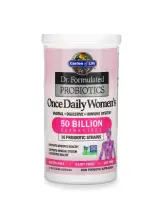
A-
Overall Grade
#2 Garden of Life Once Daily Women's Probiotics
-
OVERALL RATING
8.7/10
-
Predicted Effectiveness
9.1/10
-
Ingredient Quality
8.8/10
-
Value
8.2/10
-
Return Policy
8.8/10
-
User Rating
8.6/10
PROS
- 16 Diverse Probiotic Strains
- 50 Billion CFUs
- Includes L. rhamnosus, L. acidophilus, bifidobacterium lactis and L. gasseri
- Veggie caps, Non-GMO, Dairy & Soy Free
CONS
- Does not contain B. lactis B420
- Does not include any key herbs or minerals
- Plastic bottle instead of glass
- User complaints of bottle having a strong chemical smell
- Limited return policy
Why We Chose It
Garden of Life Once Daily Women’s Probiotics is a well-established brand and contains a dose of 50 billion CFUs with 16 diverse strains. We were happy to see that this formula included 4 of the top 4 strains, L. rhamnosus,L. Acidophilus, bifidobacterium, and L. gasseri. However, we were disappointed to see they did not include B. lactis B420 or any specific strain at all. Therefore, we assume their formula is less effective and has less clinical research to back its efficacy in comparison to our top-rated pick.
While Garden of Life Once Daily Women’s has a decent diversity of strains, it falls short of being a well-rounded women’s targeted formula by not including any of the key herbs, such as Cranberry, D-mannose, Chromium, or Hibiscus extract, for urinary and weight management support.
This product comes in vegetarian capsules, which are great for health-conscious users. Still, the inclusion of microcrystalline cellulose, a refined wood pulp used as a bulking agent during manufacturing, is not desirable as it may lead to digestive discomfort for some users in the form of bloating, gas, or constipation. We prefer to see products made from minimally processed ingredients. A common and growing complaint amongst users is a strong chemical smell emitting from the plastic bottle.
Garden of Life offers a 60-day money-back guarantee, but we would have preferred a 90-day guarantee to allow consumers more time to assess whether it is right for them
*Results are based on user-generated experiences with these products, and individual results may vary. Please refer to the manufacturer’s product website for detailed information.
#3 Happy V Women’s Daily Prebiotic + Probiotic
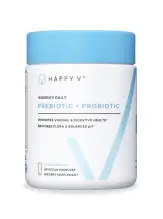
B-
Overall Grade
#3 Happy V Women's Daily Prebiotic + Probiotic
-
OVERALL RATING
7.6/10
-
Predicted Effectiveness
8.8/10
-
Ingredient Quality
8.3/10
-
Value
6.8/10
-
Return Policy
6.1/10
-
User Rating
7.8/10
PROS
- Includes L. rhamnosus, L. acidophilus, bifidobacterium lactis, and L. gasseri
- Contains clinically studied prebiotic
- Delayed-release Veggie caps, Non-GMO, Gluten & Dairy Free
CONS
- Lack of diversity in probiotic strains
- Limited potency of 20 Billion CFUs
- Does not include any key herbs or minerals
- Misrepresenting inclusion of digestive enzymes not found in the formula
- Contains Magnesium Stearate
- 30-Day return policy limited to unopened bottles
Why We Chose It
Happy V Women’s Daily Prebiotic + Probiotic has gained popularity through the company’s heavy online advertising. We liked that this formula contains the top-4 strains L. rhamnosus, L. gasseri, L. acidophilus, and Bifidobacterium lactis (with a specified strain). However, the biggest challenge with this formula is that it only includes 7 strains, with a relatively low potency at 20 billion CFUs. We prefer to see formulas that have at least 16 strains and 50 Billion CFUs per dose. We also prefer a once-a-day, easy-to-swallow capsule. Happy V Women’s Daily Prebiotic + Probiotic requires two capsules per day.
We would have also preferred to see herbal and mineral ingredients included that have more uniquely focused benefits for women’s digestive and vaginal health and weight management, such as HOWARU Femine Health Blend and Chromax, as seen with the top-rated brand on our list. Interestingly, Happy V does sell a separate product, “D-Mannose + Cranberry,” but you would have to pay an additional $40 for that product. That would bring your total monthly cost to $80 and require you to take 4 pills per day.
In analyzing this brand, we found places on both their brand site and Amazon listing page that indicate that this product contains digestive enzymes in the form of, “Digezyme (Amylase, Protease, Cellulase, Lactase, Lipase – 50mg.”) Their brand product page in the “Quality Transparency” section has a link to a Certificate of Analysis, which clearly shows the digestive enzymes in the formula. Their Amazon listing under ingredients also indicates “Transparency Compliant Label” and lists the digestive enzymes. However, their product labels do not mention any digestive enzymes whatsoever. It is challenging to believe the brand is focused on transparency when they are misrepresenting what is in their formula. Happy V backs its product with a minimal 30-day refund period, which only applies to unopened bottles. This is less than ideal. This formula uses a vegetarian capsule and is non-GMO.
*Results are based on user-generated experiences with these products, and individual results may vary. Please refer to the manufacturer’s product website for detailed information.
#4 Renew Life Women’s Care Probiotic
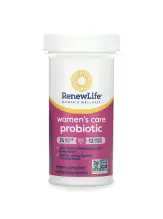
C+
Overall Grade
#4 Renew Life Women's Care Probiotic
-
OVERALL RATING
7.2/10
-
Predicted Effectiveness
6.7/10
-
Ingredient Quality
7.1/10
-
Value
6.6/10
-
Return Policy
8.8/10
-
User Rating
6.8/10
PROS
- Includes L. rhamnosus, L. acidophilus, and Bifidobacterium lactis
- Delayed-Release Capsules, Non-GMO, Dairy & Soy Free
CONS
- Only 12 Probiotic Strains
- Only 25 Billion CFUs
- Does not include any key herbs or minerals
- Does not contain prebiotics
- User complaints of digestive discomfort
- Limited return policy
Why We Chose It
Renew Life Women’s Care Probiotic formula contains 3 of the top 4 strains of probiotics but at a low dose of only 25 billion CFUs. The other challenge with this formula is that it only includes 12 strains. We like to see a minimum of 16.
Although marketed specifically as a women’s probiotic, it does not stand out as a targeted women’s formula because it does not include key herbs such as Cranberry, D-mannose, or Hibiscus extract for urinary and weight management support. It also lacks prebiotics, which are important to help the probiotics survive, grow, and populate.
Like the top-ranked brand on our list, Renew Life Women’s Care Probiotic utilizes a delayed released capsule to help protect the probiotics from harsh stomach conditions. However, the inclusion of microcrystalline cellulose, a refined wood pulp used as a bulking agent during manufacturing, is not desirable as it may lead to digestive discomfort for some users in the form of bloating, gas, or constipation which happens to be a growing complaint from users of this product. We prefer to see products made from ingredients that are minimally processed.
We noticed that Renew Life Women’s Care Probiotic recommends refrigeration, but it’s not required. This seems confusing and inconsistent with industry standards. When probiotics are freeze-dried during manufacturing, they are shelf-stable, so they shouldn’t need refrigeration.
Renew Life offers a 60-day money-back guarantee, but we would have preferred a 90-day guarantee to allow more time for consumers to assess whether it is right for them.
*Results are based on user-generated experiences with these products, and individual results may vary. Please refer to the manufacturer’s product website for detailed information.
#5 Provitalize
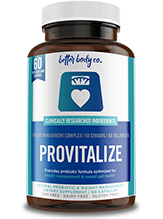
D
Overall Grade
#5 Provitalize
-
OVERALL RATING
6.7/10
-
Predicted Effectiveness
6.5/10
-
Ingredient Quality
7.2/10
-
Value
6.2/10
-
Return Policy
7.5/10
-
User Rating
6.2/10
PROS
- High CFU Count
- Includes L. gasseri and Bifidobacterium lactis
- Delayed-Release Capsules, Soy, Dairy & Gluten Free
CONS
- Only includes 2 of the top 4 strains
- Lack of strain diversity
- Does not include any of the key herbs or minerals
- Does not contain Prebiotics
- Plastic bottle
- User complaints results not achieved
- Poor Better Business Bureau (BBB) Rating
Why We Chose It
Provitalize by Better Body Co. is a popular product, partly thanks to its heavy online advertising. The brand, which appears to be based in Singapore, makes some questionable claims that it can improve digestive health, weight management, and the relief of hot flashes for menopausal women.
However, even with all the advertising geared towards this product helping women “fight menopause,” the frequently asked questions page states, “Provitalize works for men just as well as for women,” leading us to believe this company markets to women but included no ingredients unique to women’s health needs.
While we liked that the product contains 68 Billion CFUs, it has a notable lack of strain diversity, as it only has three strains in total. Compare that to the top-rated brand on our list, which has 24 unique strains, including all four top-rated strains, and even contains all three of Provitalize’s probiotic strains. Provitalize also requires you to take two pills per day.
Provitalize uses a considerable amount of marketing hype and aggressive claims; they have an F rating with the Better Business Bureau (BBB), compiling 79 complaints, 25 of which were in the last year alone, which gives us some real pause for concern. While some users have reported benefits from taking Provitalize, we found many users who reported no results. We recommend avoiding brands with claims that seem too good to be true. Choose a formula with a variety of probiotic strains, including key herbs and minerals targeting women’s health, and that prebiotics that are shown in studies to help offer vaginal and urogenital benefits as well as support for microbiome balance, digestive and immune system support, and weight management.
*Results are based on user-generated experiences with these products, and individual results may vary. Please refer to the manufacturer’s product website for detailed information.
Citations
- 1. Effect Of Probiotics On Body Weight And Body-Mass Index: A Systematic Review And Meta-analysis of Randomized, Controlled Trials”. 2021. International Journal Of Food Sciences And Nutrition. https://www.tandfonline.com/doi/abs/10.1080/09637486.2016.1181156.
- 2. Mekkes, M C et al. “The development of probiotic treatment in obesity: a review.” Beneficial microbes vol. 5,1 (2014): 19-28. doi:10.3920/BM2012.0069
- 3. Omar, Jaclyn M., Yen-Ming Chan, Mitchell L. Jones, Satya Prakash, and Peter J.H. Jones. 2013. “Lactobacillus Fermentum And Lactobacillus Amylovorus As Probiotics Alter Body Adiposity And Gut Microflora In Healthy Persons”. Journal Of Functional Foods 5 (1): 116-123.
- 4. Kadooka, Y et al. “Regulation of abdominal adiposity by probiotics (Lactobacillus gasseri SBT2055) in adults with obese tendencies in a randomized controlled trial.” European journal of clinical nutrition vol. 64,6 (2010): 636-43. doi:10.1038/ejcn.2010.19
- 5. Ribeiro, F C et al. “Action mechanisms of probiotics on Candida spp. and candidiasis prevention: an update.” Journal of Applied Microbiology vol. 129,2 (2020): 175-185. doi:10.1111/jam.14511
- 6. Muhleisen, Alicia L., and Melissa M. Herbst-Kralovetz. 2016. “Menopause And The Vaginal Microbiome”. Maturitas 91: 42-50.
- 7. Cheng, Jing, and Arthur C. Ouwehand. 2020. “Gastroesophageal Reflux Disease And Probiotics: A Systematic Review”. Nutrients 12 (1): 132.
- 8. Allen, Stephen J, Elizabeth G Martinez, Germana V Gregorio, and Leonila F Dans. 2010. “Probiotics For Treating Acute Infectious Diarrhoea”. Cochrane Database Of Systematic Reviews.
- 9. Guandalini, Stefano. 2011. “Probiotics For Prevention And Treatment Of Diarrhea”. Journal Of Clinical Gastroenterology 45: S149-S153.
- 10. Miller, Larry E et al. “Contemporary meta-analysis of short-term probiotic consumption on gastrointestinal transit.” World journal of gastroenterology vol. 22,21 (2016): 5122-31. doi:10.3748/wjg.v22.i21.5122
- 11. Hungin, A P S et al. “Systematic review: probiotics in the management of lower gastrointestinal symptoms in clinical practice — an evidence-based international guide.” Alimentary pharmacology & therapeutics vol. 38,8 (2013): 864-86. doi:10.1111/apt.12460
- 12. Lee, Sol et al. “The Effect of Lactobacillus gasseri BNR17 on Postmenopausal Symptoms in Ovariectomized Rats.” Journal of microbiology and biotechnology vol. 31,9 (2021): 1281-1287. doi:10.4014/jmb.2105.05032
- 13. Wang, Huiying et al. “Effect of Probiotics on Central Nervous System Functions in Animals and Humans: A Systematic Review.” Journal of Neurogastroenterology and motility vol. 22,4 (2016): 589-605. doi:10.5056/jnm16018
- 14. Steenbergen, Laura et al. “A randomized controlled trial to test the effect of multispecies probiotics on cognitive reactivity to sad mood.” Brain, behavior, and immunity vol. 48 (2015): 258-64. doi:10.1016/j.bbi.2015.04.003
- 15. Szydłowska I;Marciniak A;Brodowska A;Loj B;Ciećwież S;Skonieczna-Żydecka K;Palma J;Łoniewski I;Stachowska E; 2024. “Effects of Probiotics Supplementation on the Hormone and Body Mass Index in Perimenopausal and Postmenopausal Women Using the Standardized Diet. A 5-Week Double-Blind, Placebo-Controlled, and Randomized Clinical Study.” European Review for Medical and Pharmacological Sciences. U.S. National Library of Medicine.
- 16. Zou, Siying et al. “Association of probiotic ingestion with serum sex steroid hormones among pre- and postmenopausal women from the NHANES, 2013-2016.” PloS one vol. 18,11 e0294436. 16 Nov. 2023, doi:10.1371/journal.pone.0294436
- 17. Ritchie, Marina L., and Tamara N. Romanuk. 2012. “A Meta-Analysis Of Probiotic Efficacy For Gastrointestinal Diseases”. Plos ONE 7 (4): e34938.
- 18. Ashraf, Rabia, and Nagendra P. Shah. 2014. Critical Reviews in Food Science and Nutrition 54 (7): 938–56.
- 19. Blum, S., Haller, D., Pfeifer, A. et al. Probiotics and immune response. Clinic Rev Allerg Immunol 22, 287–309 (2002).
- 20. Pediatrics, Department of. 2024. “Probiotics and Immune Health : Current Opinion in Gastroenterology.” LWW.
- 21. Fenster, Kurt et al. “The Production and Delivery of Probiotics: A Review of a Practical Approach.” Microorganisms vol. 7,3 83. 17 Mar. 2019, doi:10.3390/microorganisms7030083.
- 22. Choi, Béatrice S-Y et al. “Lacticaseibacillus rhamnosus HA-114 improves eating behaviors and mood-related factors in adults with overweight during weight loss: a randomized controlled trial.” Nutritional neuroscience vol. 26,7 (2023): 667-679. doi:10.1080/1028415X.2022.2081288
- 23. Sanchez, Marina et al. “Effect of Lactobacillus rhamnosus CGMCC1.3724 supplementation on weight loss and maintenance in obese men and women.” The British journal of nutrition vol. 111,8 (2014): 1507-19. doi:10.1017/S0007114513003875
- 24. Bravo, Javier A et al. “Ingestion of Lactobacillus strain regulates emotional behavior and central GABA receptor expression in a mouse via the vagus nerve.” Proceedings of the National Academy of Sciences of the United States of America vol. 108,38 (2011): 16050-5. doi:10.1073/pnas.1102999108
- 25. Slykerman, R F et al. “Effect of Lactobacillus rhamnosus HN001 in Pregnancy on Postpartum Symptoms of Depression and Anxiety: A Randomised Double-blind Placebo-controlled Trial.” EBioMedicine vol. 24 (2017): 159-165. doi:10.1016/j.ebiom.2017.09.013
- 26. Zheng, Yan et al. “Lactobacillus rhamnosus Probio-M9 Improves the Quality of Life in Stressed Adults by Gut Microbiota.” Foods (Basel, Switzerland) vol. 10,10 2384. 8 Oct. 2021, doi:10.3390/foods10102384
- 27. Ansari, AbuZar et al. “Lactobacillus Probiotics Improve Vaginal Dysbiosis in Asymptomatic Women.” Nutrients vol. 15,8 1862. 13 Apr. 2023, doi:10.3390/nu15081862
- 28. Kailasapathy, K, and J Chin. “Survival and therapeutic potential of probiotic organisms with reference to Lactobacillus acidophilus and Bifidobacterium spp.” Immunology and cell biology vol. 78,1 (2000): 80-8. doi:10.1046/j.1440-1711.2000.00886.x
- 29. Celebi, Ozgur et al. “Effect of the combination of Lactobacillus acidophilus (probiotic) with vitamin K3 and vitamin E on Escherichia coli and Staphylococcus aureus: An in vitro pathogen model.” Molecular medicine reports vol. 27,6 (2023): 119. doi:10.3892/mmr.2023.13006
- 30. Spaggiari, Luca et al. “Lactobacillus acidophilus, L. plantarum, L. rhamnosus, and L. reuteri Cell-Free Supernatants Inhibit Candida parapsilosis Pathogenic Potential upon Infection of Vaginal Epithelial Cells Monolayer and in a Transwell Coculture System In Vitro.” Microbiology spectrum vol. 10,3 (2022): e0269621. doi:10.1128/spectrum.02696-21
- 31. De Alberti, Davide et al. “Lactobacilli vaginal colonisation after oral consumption of Respecta(®) complex: a randomised controlled pilot study.” Archives of gynecology and obstetrics vol. 292,4 (2015): 861-7. doi:10.1007/s00404-015-3711-4
- 32. Russo, Rosario et al. “Study on the effects of an oral lactobacilli and lactoferrin complex in women with intermediate vaginal microbiota.” Archives of gynecology and obstetrics vol. 298,1 (2018): 139-145. doi:10.1007/s00404-018-4771-z
- 33. Russo, R et al. “Evidence-based mixture containing Lactobacillus strains and lactoferrin to prevent recurrent bacterial vaginosis: a double blind, placebo controlled, randomised clinical trial.” Beneficial microbes vol. 10,1 (2019): 19-26. doi:10.3920/BM2018.0075
- 34. Uusitupa, Henna-Maria et al. “Bifidobacterium animalis subsp. lactis 420 for Metabolic Health: Review of the Research.” Nutrients vol. 12,4 892. 25 Mar. 2020, doi:10.3390/nu12040892
- 35. Stenman, Lotta K et al. “Probiotic With or Without Fiber Controls Body Fat Mass, Associated With Serum Zonulin, in Overweight and Obese Adults-Randomized Controlled Trial.” EBioMedicine vol. 13 (2016): 190-200. doi:10.1016/j.ebiom.2016.10.036
- 36. Miyoshi, Masaya et al. “Anti-obesity effect of Lactobacillus gasseri SBT2055 accompanied by inhibition of pro-inflammatory gene expression in the visceral adipose tissue in diet-induced obese mice.” European journal of nutrition vol. 53,2 (2014): 599-606. doi:10.1007/s00394-013-0568-9
- 37. Kadooka, Yukio et al. “Effect of Lactobacillus gasseri SBT2055 in fermented milk on abdominal adiposity in adults in a randomized controlled trial.” The British journal of nutrition vol. 110,9 (2013): 1696-703. doi:10.1017/S0007114513001037
- 38. Kim, Joohee et al. “Lactobacillus gasseri BNR17 Supplementation Reduces the Visceral Fat Accumulation and Waist Circumference in Obese Adults: A Randomized, Double-Blind, Placebo-Controlled Trial.” Journal of medicinal food vol. 21,5 (2018): 454-461. doi:10.1089/jmf.2017.3937
- 39. Parvaneh, Kolsoom et al. “Effect of probiotics supplementation on bone mineral content and bone mass density.” TheScientificWorldJournal vol. 2014 595962. 22 Jan. 2014, doi:10.1155/2014/595962
- 40. Whitcroft S, Herriot A. Insulin resistance and management of the menopause: a clinical hypothesis in practice. Menopause Int. 2011 Mar;17(1):24-8. doi: 10.1258/mi.2011.011003. PMID: 21427422.
- 41. Tian, Hongliang et al. “Chromium picolinate supplementation for overweight or obese adults.” The Cochrane database of systematic reviews vol. 2013,11 CD010063. 29 Nov. 2013, doi:10.1002/14651858.CD010063.pub2
- 42. Havel PJ. A scientific review: the role of chromium in insulin resistance. Diabetes Educ. 2004;Suppl:2-14. PMID: 15208835.
- 43. Anderson, R.A., Polansky, M.M. and Bryden, N.A. 2004. Stability and absorption of chromium and absorption of chromium histidinate complexes by humans. Biological Trace Elements Research. 101:211-218
- 44. Gupta, K., M.Y. Chou, A. Howell, C. Wobbe, R. Grady, and A.E. Stapleton. 2007. Journal of Urology 177 (6): 2357–60.
- 45. Lenger, Stacy M et al. “D-mannose vs other agents for recurrent urinary tract infection prevention in adult women: a systematic review and meta-analysis.” American journal of obstetrics and gynecology vol. 223,2 (2020): 265.e1-265.e13. doi:10.1016/j.ajog.2020.05.048
- 46. Wagenlehner, Florian et al. “Why d-Mannose May Be as Efficient as Antibiotics in the Treatment of Acute Uncomplicated Lower Urinary Tract Infections-Preliminary Considerations and Conclusions from a Non-Interventional Study.” Antibiotics (Basel, Switzerland) vol. 11,3 314. 25 Feb. 2022, doi:10.3390/antibiotics11030314
- 47. Gu, Ranli et al. “D-Mannose prevents bone loss under weightlessness.” Journal of translational medicine vol. 21,1 8. 9 Jan. 2023, doi:10.1186/s12967-022-03870-1
- 48. Hsia, G. Rush, P. Thornalley, T.H. Tseng, F. Ursini, et al. 1998. “Protective Effects of Dried Flower Extracts of Hibiscus Sabdariffa L. against Oxidative Stress in Rat Primary Hepatocytes.” Food and Chemical Toxicology. Pergamon. February 25.
- 49. S. Bluher, et al. 2007. “Hibiscus Sabdariffa L. Water Extract Inhibits the Adipocyte Differentiation through the PI3-K and MAPK Pathway.” Journal of Ethnopharmacology. Elsevier. August 19.
- 50. Chang HC;Peng CH;Yeh DM;Kao ES;Wang CJ; 2024. “Hibiscus Sabdariffa Extract Inhibits Obesity and Fat Accumulation, and Improves Liver Steatosis in Humans.” Food & Function. U.S. National Library of Medicine.
- 51. Mohamed-Salem, Reda et al. “Aqueous extract of Hibiscus sabdariffa inhibits pedestal induction by enteropathogenic E. coli and promotes bacterial filamentation in vitro.” PloS one vol. 14,3 e0213580. 8 Mar. 2019, doi:10.1371/journal.pone.0213580
- 52. “NUTRAFLORA® Prebiotic Fiber”. Ingredion.Com. https://www.ingredion.com/na/en-us/ingredients/ingredient-product-families/nutraflora-prebiotic-fiber.html.
- 53. Carlson, Justin L et al. “Prebiotic Dietary Fiber and Gut Health: Comparing the in Vitro Fermentations of Beta-Glucan, Inulin and Xylooligosaccharide.” Nutrients vol. 9,12 1361. 15 Dec. 2017, doi:10.3390/nu9121361
- 54. Tandon D, Haque MM, Gote M, et al. A prospective randomized, double-blind, placebo-controlled, dose-response relationship study to investigate efficacy of fructo-oligosaccharides (FOS) on human gut microflora. Sci Rep. 2019;9(1):5473. Published 2019 Apr 2. doi:10.1038/s41598-019-41837-3
- 55. Reimer RA, Soto-Vaca A, Nicolucci AC, et al. Effect of chicory inulin-type fructan-containing snack bars on the human gut microbiota in low dietary fiber consumers in a randomized crossover trial. Am J Clin Nutr. 2020;111(6):1286-1296. doi:10.1093/ajcn/nqaa074
- 56. Abe, Fumiaki, Hirofumi Miyauchi, Ayako Uchijima, et al. Effects Of Storage Temperature And Water Activity On The Survival Of Bifidobacteria In Powder Form. International Journal Of Dairy Technology 62 (2): 234-239.https://doi.org/10.1111/j.1471-0307.2009.00464.x















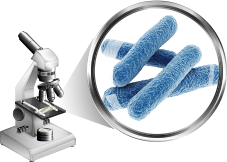 1. Lactobacillus Rhamnosus
1. Lactobacillus Rhamnosus 2. Lactobacillus Acidophilus
2. Lactobacillus Acidophilus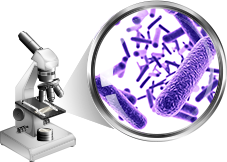 3. Bifidobacterium lactis
3. Bifidobacterium lactis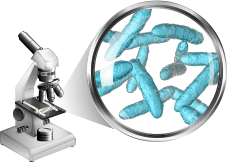 4. Lactobacillus Gasseri
4. Lactobacillus Gasseri
